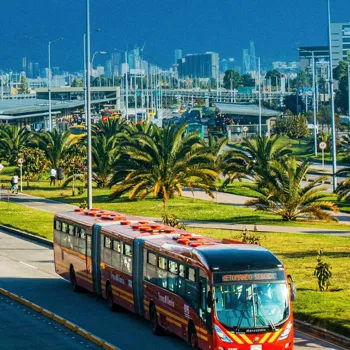Discover how to travel sustainably without sacrificing style! 8 tips to explore the world responsibly
Traveling is a dream for many, isn't it? Exploring new places, experiencing different cultures, and
making memories that last a lifetime. But, let's be honest, all that jet-setting can take a toll on our beautiful planet. Don't worry, you don't have to give up your travel dreams.
You can travel sustainably without compromising on your style! Here are eight tips to help you travel responsibly while still looking good:
Pack Smart, Pack Light (and Eco-Friendly!)
The first step towards sustainable travel is packing efficiently. Think minimalist! Do you really need five pairs of shoes for a week-long trip? Probably not. A lighter suitcase means less fuel consumption by the plane, train, or car you're using.

Choose versatile clothing items that can be mixed and matched to create different outfits. Opt for clothes made from sustainable materials like organic cotton, hemp, or recycled fabrics. These materials are not only better for the environment but often feel great on your skin too.
When it comes to toiletries, consider solid shampoo bars, conditioners, and soaps. These eliminate the need for plastic bottles and are also travel-friendly in case of spillage. Remember to pack a reusable water bottle and a reusable shopping bag.
These will come in handy throughout your journey and reduce your reliance on single-use plastics. Nowadays, you can easily purchase foldable and stylish reusable shopping bags that fit conveniently in your purse or backpack.
Furthermore, think about the environmental impact of your luggage itself.
Instead of buying a new suitcase, consider repairing your old one or borrowing one from a friend or family member. If you do need to buy a new bag, look for brands that use recycled materials or have sustainable manufacturing practices. Durability is also key.
Investing in a well-made bag that will last for years is much more sustainable than buying a cheap one that will fall apart after a few trips. When packing electronics, remember to bring your own chargers and adapters.
This way, you won't have to buy new ones at your destination, reducing electronic waste. Consider packing a small solar charger to power your devices using renewable energy. It's a great way to stay connected while minimizing your environmental impact.
Don't forget a small first-aid kit with essential medicines and bandages. This will help you avoid unnecessary trips to the pharmacy and prevent you from buying single-use plastic packaging.
Opt for eco-friendly sunscreen, insect repellent and other essentials to minimize your environmental footprint, all whilst looking your stylish best while you're at it. Packing cubes can be your best friend when it comes to packing light.
They help you compress your clothes and keep your suitcase organized, saving space and making it easier to find what you need.
Choose Eco-Friendly Accommodation
Where you stay can have a significant impact on the environment. Look for hotels or guesthouses that are committed to sustainability. Many accommodations are now implementing eco-friendly practices such as using renewable energy, conserving water, reducing waste, and supporting local communities.

Check for certifications like LEED or Green Globe, which indicate a commitment to environmental standards. Read reviews to see what other travelers say about the hotel's sustainability efforts.
Booking directly with the hotel can sometimes give you more information about their practices and allow you to ask questions about their sustainability initiatives. Consider staying in smaller, locally-owned guesthouses or homestays.
These often have a smaller environmental footprint and provide a more authentic cultural experience. Plus, you'll be supporting the local economy.
When you arrive at your accommodation, take advantage of the eco-friendly amenities offered, such as recycling programs, water-saving showerheads, and energy-efficient lighting. If your hotel offers a linen reuse program, participate in it to reduce water and energy consumption.
Turn off lights and electronic devices when you leave your room to conserve energy.
Before booking your stay, spend some time researching different options. Look for accommodations that have a strong commitment to reducing their environmental impact.
Ask the hotel or guesthouse about their water conservation efforts. Do they have low-flow showerheads and toilets? Do they recycle water for irrigation? Ask about their energy-saving practices. Do they use renewable energy sources? Do they have energy-efficient lighting and appliances?
Inquire about their waste reduction initiatives. Do they have a recycling program? Do they compost food waste? Do they use reusable or biodegradable products? Check out the location of the accommodation. Is it easily accessible by public transportation? Is it close to local attractions?
Staying in a centrally located accommodation can help you reduce your reliance on taxis or rental cars. Don’t be afraid to ask questions! The more you know about their sustainability practices, the better equipped you'll be to make an informed decision.
By choosing eco-friendly accommodation, you can relax and enjoy your trip knowing that you're minimizing your environmental impact.
Support Local Businesses and Artisans
Instead of buying souvenirs from big chain stores, support local artisans and businesses. This not only helps the local economy but also ensures that you're getting unique and authentic products.
Visit local markets, craft fairs, and independent shops to find handcrafted items, locally made food products, and traditional crafts. Shopping locally reduces the need for long-distance transportation of goods, which contributes to carbon emissions.
It also helps preserve local traditions and cultural heritage. Plus, you'll have a chance to meet the artisans and learn about their craft, enhancing your travel experience.
When buying souvenirs, look for items made from sustainable materials, such as recycled paper, bamboo, or locally sourced wood. Avoid buying products made from endangered species or illegally harvested materials.
Bargaining is common in many cultures, but be respectful and fair when negotiating prices. Remember that you're supporting someone's livelihood. Consider taking a cooking class or attending a cultural workshop to learn about local traditions and support local instructors.
Visiting local businesses is more than just a shopping trip, it can be a glimpse into the heart of a culture. It can be a way to connect with the true essence of a place. Ask a local for unique recommendations, and you may find hidden gems that you would find hard to miss.
By supporting local businesses, you help create jobs, preserve traditions, and contribute to the overall well-being of the community. Supporting local businesses and artisans is also a great way to learn about the local culture. Talk to the shopkeepers and artisans.
Ask them about their craft, their history, and their inspirations. You might be surprised by what you learn. You may even walk away with a deeper appreciation for the local culture. By choosing to buy local, you are not just buying a product but you are investing in the community's future.
Small actions can make a big difference in preserving the beauty, culture that surrounds us.
Embrace Public Transport and Active Travel
Instead of relying solely on taxis or rental cars, embrace public transport and active travel options. Many cities have efficient and affordable public transportation systems, such as buses, trains, and metros.

Using public transport reduces traffic congestion and air pollution, making your journey more sustainable. Walking and cycling are great ways to explore a new city while getting some exercise and reducing your carbon footprint. Many cities offer bike-sharing programs or bike rentals for tourists.
Consider renting a scooter or using a ride-sharing service that uses electric vehicles. This helps reduce your reliance on fossil fuels. If you're traveling between cities, opt for train travel instead of flying whenever possible.
Trains are generally more fuel-efficient than airplanes and offer a more scenic and relaxing way to travel. When possible, choose to walk or bicycle the shorter distances. Discover the hidden gems of a city is always an adventure when using sustainable travel options.
When planning your trip, research the public transportation options available at your destination. Look for maps and schedules online or at the airport. Consider purchasing a travel pass for unlimited access to public transport during your stay.
This can save you money and make it easier to get around. If you're traveling with a group, consider renting a carpool or hiring a private bus for day trips. This can be more sustainable than everyone renting their own car. Pack light so that you can easily carry your luggage on public transport.
Remember to be respectful of other passengers and follow the rules of the transportation system. Be prepared for delays and crowds, especially during peak hours. Embrace it as part of the travel experience! The joy of traveling is not only about your destination but also the journey as well.
So travel responsibly and make memories that last.
Reduce Your Food Waste
Food waste is a major environmental problem, contributing to greenhouse gas emissions and wasting valuable resources. When traveling, be mindful of your food consumption and take steps to reduce waste. Avoid ordering more food than you can eat at restaurants.
If you have leftovers, ask for a doggy bag to take them with you. Choose restaurants that source their ingredients locally and sustainably. Support businesses that are committed to reducing food waste and supporting local farmers. Carry a reusable container with you to store leftovers or snacks.
This helps you avoid using disposable containers. When grocery shopping, buy only what you need and plan your meals to avoid wasting food. Store food properly to keep it fresh for longer. Be open to trying local cuisine and street food.
These are often less expensive and more sustainable than eating at touristy restaurants.
Do some research and find out what local produce is in season, and incorporate it into your meals. Before throwing away food, think about whether it can be used in another dish.
You can freeze leftovers for later. Don’t be afraid to get creative in the kitchen. Educate yourself about the impact of food waste on the environment. The more you know, the more motivated you will be to reduce waste.
Talk to your friends and family about food waste and encourage them to make small changes. By reducing food waste, you can save money, reduce your environmental impact, and support sustainable practices. Consider packing a small reusable shopping bag for groceries and souvenirs.
This helps you avoid using plastic bags. Many businesses offer discounts or incentives for customers who bring their own bags. By making these small changes, you can significantly reduce your environmental footprint.
Respect Local Customs and Culture
When visiting a new place, it's important to be respectful of local customs and culture. This includes dressing modestly, learning a few basic phrases in the local language, and being mindful of your behavior in public spaces.

Research the local customs before you travel so that you know what to expect and how to behave appropriately. Avoid taking photos of people without their permission. Be respectful of religious sites and traditions. Avoid making loud noises or disturbing the peace in residential areas.
Learn about the local culture and history by visiting museums, attending cultural events, and talking to local people. Support local businesses and artisans to contribute to the local economy. Be aware of your environmental impact and take steps to minimize it. Respect local laws and regulations.
Before you go, educate yourself about the local culture and customs. Read travel guides, watch documentaries, and visit websites that provide information about the local culture. This will help you avoid making cultural faux pas and show respect for the local people.
When interacting with local people, be polite, friendly, and respectful. Avoid using slang or offensive language. Dress modestly and avoid wearing revealing clothing, especially when visiting religious sites.
Learn a few basic phrases in the local language, such as "hello," "thank you," and "please." This will show that you are making an effort to connect with the local culture. Support local businesses and artisans by buying souvenirs and products from local shops and markets.
This helps to boost the local economy and preserve traditional crafts. Be mindful of the environment and avoid littering, wasting water, or damaging natural resources. Respect local laws and regulations. This includes traffic laws, noise ordinances, and alcohol restrictions.
AI Generated Content. Glance/InMobi shall have no liability for the content












